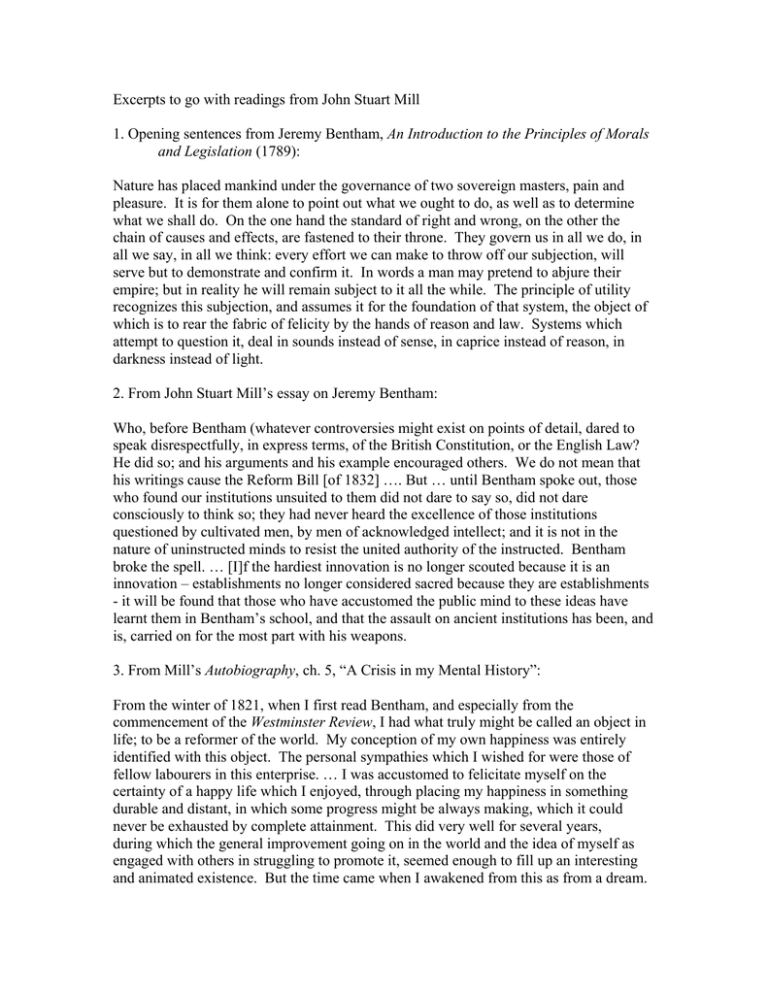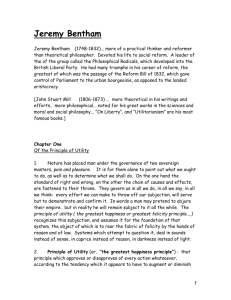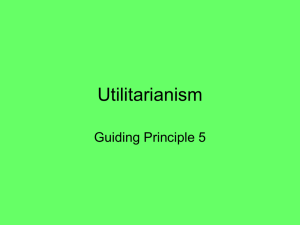Excerpts to go with readings from John Stuart Mill
advertisement

Excerpts to go with readings from John Stuart Mill 1. Opening sentences from Jeremy Bentham, An Introduction to the Principles of Morals and Legislation (1789): Nature has placed mankind under the governance of two sovereign masters, pain and pleasure. It is for them alone to point out what we ought to do, as well as to determine what we shall do. On the one hand the standard of right and wrong, on the other the chain of causes and effects, are fastened to their throne. They govern us in all we do, in all we say, in all we think: every effort we can make to throw off our subjection, will serve but to demonstrate and confirm it. In words a man may pretend to abjure their empire; but in reality he will remain subject to it all the while. The principle of utility recognizes this subjection, and assumes it for the foundation of that system, the object of which is to rear the fabric of felicity by the hands of reason and law. Systems which attempt to question it, deal in sounds instead of sense, in caprice instead of reason, in darkness instead of light. 2. From John Stuart Mill’s essay on Jeremy Bentham: Who, before Bentham (whatever controversies might exist on points of detail, dared to speak disrespectfully, in express terms, of the British Constitution, or the English Law? He did so; and his arguments and his example encouraged others. We do not mean that his writings cause the Reform Bill [of 1832] …. But … until Bentham spoke out, those who found our institutions unsuited to them did not dare to say so, did not dare consciously to think so; they had never heard the excellence of those institutions questioned by cultivated men, by men of acknowledged intellect; and it is not in the nature of uninstructed minds to resist the united authority of the instructed. Bentham broke the spell. … [I]f the hardiest innovation is no longer scouted because it is an innovation – establishments no longer considered sacred because they are establishments - it will be found that those who have accustomed the public mind to these ideas have learnt them in Bentham’s school, and that the assault on ancient institutions has been, and is, carried on for the most part with his weapons. 3. From Mill’s Autobiography, ch. 5, “A Crisis in my Mental History”: From the winter of 1821, when I first read Bentham, and especially from the commencement of the Westminster Review, I had what truly might be called an object in life; to be a reformer of the world. My conception of my own happiness was entirely identified with this object. The personal sympathies which I wished for were those of fellow labourers in this enterprise. … I was accustomed to felicitate myself on the certainty of a happy life which I enjoyed, through placing my happiness in something durable and distant, in which some progress might be always making, which it could never be exhausted by complete attainment. This did very well for several years, during which the general improvement going on in the world and the idea of myself as engaged with others in struggling to promote it, seemed enough to fill up an interesting and animated existence. But the time came when I awakened from this as from a dream. It was in the autumn of 1826 [i.e. when he was 20]. I was in a dull state of nerves, such as everybody is occasionally liable to; unsuceptible to enjoyment or pleasurable excitement; one of those moods when what is pleasure at other times, becomes insipid or indifferent …. In this frame of mind it occurred to me to put the question directly to myself, “Suppose that all your objects in life were realized; that all the changes in institutions and opinions which you are looking forward to, could be completely effected at this very instant: would this be a great joy and happiness to you?” And an irrepressible self-consciousness distinctly answered, “No!” At this my heart sank within me: the whole foundation on which my life was constructed fell down. All my happiness was to have been found in the continual pursuit of this end. The end has ceased to charm, and how could there ever again be any interest in the means? I seemed to have nothing left to live for. … My father, to whom it would have been natural to me to have recourse in any practical difficulties, was the last person to whom, in such a case as this, I looked for help. … My education, which was wholly his work, had been conducted without any regard to the possibility of its ending in this result; and I saw no use in giving him the pain of thinking that his plans had failed …. Of other friends, I had at that time none to whom I had any hope of making my condition intelligible. It was however abundantly intelligible to myself; and the more I dwelt upon it, the more hopeless it appeared. My course of study had led me to believe, that all mental and moral feelings and qualities, whether of a good or of a bad kind, were the results of association; that we love one thing and hate another, take pleasure in one sort of action or contemplation, and pain in another sort, through the clinging of pleasurable or painful ideas to those things, from the effect of education or of experience. As a corollary from this, I had always heard it maintained by my father, and was myself convinced, that the object of education should be to form the strongest possible associations of the salutary class; associations of pleasure with all things beneficial to the great whole, and of pain with all things hurtful to it. This doctrine appeared inexpugnable; but it now seemed to me on retrospect, that my teachers had occupied themselves but superficially with the means of forming and keeping up these salutary associations. They seemed to have trusted altogether to the old familiar instruments, praise and blame, reward and punishment. Now I did not doubt that by these means, begun early and applied unremittingly, intense associations of pain and pleasure, especially of pain, might be created, and might produce desires and aversions capable of lasting undiminished to the end of life. But there must always be something artificial and casual in associations thus produced. The pains and pleasures thus forcibly associated with things, are not connected with them by any natural tie; and it is therefor, I thought, essentially to the durability of these associations, that they should have become so intense and inveterate as to be practically indissoluble, before the habitual exercise of the power of analysis had commenced. For I now saw, or thought I saw, what I had always before received with incredulity - that the habit of analysis has a tendency to wear away the feelings: as indeed it has when no other mental habit is cultivated, and the analysing spirit remains without its natural complements and correctives. The very excellence of analysis (I argued) is that it tends to weaken and undermine whatever is the result of prejudice; that it enables us mentally to separate ideas which have only casually clung together; and no associations whatever could ultimately resist this dissolving force, were it not that we owe to analysis our clearest knowledge of the permanent sequences in nature; the real connexions between Things, not dependent on our will and feelings; natural laws, by virtue of which, in many cases, one thing is inseparable from another in fact; which laws, in proportion as they are clearly perceived and imaginatively realized, cause our ideas of things which are always joined together in Nature, to cohere more and more closely in our thoughts. Analytic habits may thus even strengthen the associations between causes and effects, means and ends, but tend altogether to weaken those which are, to speak familiarly, a mere matter of feeling. They are therefore (I thought) favourable to prudence and clearsightedness, but a perpetual worm at the root both of the passions and of the virtues; and above all, fearfully undermine all desires, and all pleasures, which are the effects of association, that is, according to the theory I held, all except the purely physical and organic; of the entire insufficiency of which to make life desirable, no one had a stronger conviction than I had.



